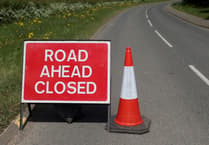A “HORRENDOUS” fly-tipping incident in Alice Holt Forest has led the Forestry Commission to plead with businesses and homeowners to check the credentials of those paid to dispose of their rubbish.
Mr Souter told the Herald he was appalled by the “horrendous mess” which pollutes the environment, and poses a physical danger to wildlife and pets.
The incident was found near Gravel Hill Road, which connects to the A325.
Sightings of fly-tipping have increased in the south-east, with 121,283 incidents recorded in 2020-21, which is a rise of 30,776 incidents on the previous 12 months.
By law, fly-tippers who are caught in the act can receive on the spot penalty fines of up to £400. Alice Holt has CCTV in operation, and this can aid the identification of the fly-tippers.
But even without the perpetrators’ identity, the activity can be curbed by identifying who the waste originally belonged to. Since January 2019, householders can also face up to a £400 penalty for failing to pass their waste on to a licensed carrier.
Alice Holt belongs to the Forestry Commission and a spokesperson from Forestry England, the organisation that manages Alice Holt, confirmed a fly-tipping incident found last Thursday had now been cleared up.
The spokesperson said: “Forestry England works closely with our local partners to tackle fly-tipping and we acted swiftly to remove this waste from our land.”
Forestry England urges businesses and householders to check that the company or individual who is offering to take their waste has a waste carrier’s licence. This can be checked on the Environment Agency’s website.
“If they do not have a licence, do not use them,” the spokesman added.
While legal redress takes time, the more immediate response of the Forestry Commission to fly-tipping is organising waste removal.
A 2018 government-commissioned independent review found it can cost between £10,000 and £500,000 to clean up a single site.
The overall cost to the UK economy of fly-tipping is estimated at £600 million each year. However, with a 16 per cent increase in this illegal activity – jumping from 980,000 cases in 2019-20 in England to 1.13 million cases in 2020-21 – the clearing up costs will increase.
The pandemic has been cited by the government as a reason for increasing numbers of fly-tipping incidents. During the 2020 lockdown, household waste recycling centres (HWRCs) were closed and some local authorities struggled to perform recycling and bulky waste collections. Some restrictions continue to be in place, such as booking systems which are in operation at the Alton HWRC.
A spokesperson from Surrey Wildlife Trust, a charity protecting the natural environment, said not only is fly-tipping a crime, but it also “damages the fragile natural habitats”. With toxic materials, broken glass and even asbestos being illegally dumped, fly-tipping waste “can trap, injure or kill wildlife”.
Furthermore, seemingly harmless garden waste also produces negative environmental impacts.
Dumped grass cuttings can change soil nutrient levels, making it harder for wildflowers to grow, as they are out-competed by nettles and brambles. There is also the threat of the introduction of native species contained in the waste.
A regular walker in the forest, Mr Souter has noticed an increase in the amount of fly-tipping since the start of the lockdowns.
While the fly-tipping actions are those performed by a minority, Mr Souter noted the impacts are “upsetting to everyone” as Alice Holt is a public access forest, regularly enjoyed by around 450,000 visitors every year for its woodland trails and recreational land.
Forestry England wants anyone with any information relating to the fly-tip found by Mr Souter to contact the organisation directly on 0300 067 4601 or email [email protected]
All information provided will be treated in confidence.



